#iOS 8 enterprise app development
Explore tagged Tumblr posts
Text
Boost Your Business with Oman’s Leading App Developers
In today’s digital-first world, businesses must evolve quickly to keep pace with customer expectations and competition. Whether you run a local startup or a well-established brand, embracing digital transformation isn’t just a trend — it’s a necessity. And where better to start than with a custom mobile app built by Oman’s leading app developers?
From Muscat to Sohar, the demand for smart, scalable, and secure mobile solutions is growing fast. Partnering with top-tier talent in mobile app development company in Oman could be the smartest move for your business this year.
📲 Why Mobile Apps Are Essential for Omani Businesses in 2025
Oman’s business landscape is shifting. Consumers expect quick services, real-time updates, and 24/7 accessibility — all through their smartphones. That’s why more businesses are turning to professional app development services in Oman to future-proof their offerings.
Here’s what a custom app can do for you:
Increase customer engagement
Improve operational efficiency
Offer mobile-first experiences
Support digital payments and online bookings
Build brand loyalty with personalized features
When developed properly, an app isn’t just a tech tool — it becomes an extension of your business.
🏆 Who Are Oman’s Leading App Developers?
The Sultanate is now home to several development firms offering world-class mobile solutions. However, not all companies understand the local market the way Oman-based developers do.
One company that consistently delivers outstanding results is Five Programmers. Known for blending cutting-edge technology with deep cultural understanding, Five Programmers has helped numerous Omani businesses build apps that perform, scale, and deliver real ROI.
🛠️ Key Services Offered by Top App Developers in Oman
Whether you need a simple booking platform or a full-scale enterprise application, Oman’s top development teams offer:
Custom iOS and Android App Development
Cross-Platform Development using Flutter and React Native
UI/UX Design Focused on Arabic & English Audiences
Real-Time Analytics Dashboards
API Integrations with Local Payment Gateways
Post-Launch App Maintenance & Upgrades
By choosing a team with a strong local presence, like Five Programmers, you ensure your app is aligned with both Omani business culture and global mobile standards.
🚀 Industries Benefiting from Mobile App Development in Oman
Let’s take a look at how various sectors are integrating apps to boost productivity and growth:
🛍️ Retail & E-Commerce
Build user-friendly shopping apps with secure checkouts, loyalty systems, and delivery tracking.
🏥 Healthcare
Enable appointment bookings, telehealth services, and e-prescriptions through HIPAA-compliant apps.
📚 Education
Launch e-learning platforms, virtual classrooms, and attendance management tools.
🚚 Logistics & Transportation
Track vehicles, manage fleets, and update deliveries in real-time.
🏨 Hospitality & Tourism
Let users book hotels, tours, and explore Oman through interactive mobile guides.
All these apps become more powerful when built by experienced Oman app development companies who understand the country’s digital maturity and expectations.
💼 Real Business Transformations with Five Programmers
Here are just a few ways Five Programmers has helped local businesses scale through mobile app development in Oman:
Developed a logistics app that reduced delivery time by 35% for a courier company in Muscat.
Built a bilingual appointment management app for a private medical clinic in Sohar.
Created a full-featured e-commerce app for a traditional crafts shop in Nizwa, boosting online orders by 50%.
Their expertise goes beyond writing code — it’s about solving real problems for real businesses in Oman.
💬 FAQs – Mobile App Development in Oman
Q1: How long does it take to develop a mobile app in Oman? A basic app may take 6–8 weeks, while complex apps with custom features can take 3–4 months. Five Programmers uses agile sprints to deliver fast, flexible results.
Q2: Can I build a bilingual app in Arabic and English? Yes, this is highly recommended for the Omani market. Local developers specialize in bilingual mobile apps that serve both audiences effectively.
Q3: Will the app support local payment gateways? Absolutely. Top developers integrate with payment systems commonly used in Oman, such as OmanNet and international options like Visa/MasterCard.
Q4: Can I get ongoing support after the app is launched? Yes. Reliable firms like Five Programmers offer ongoing maintenance, updates, and feature enhancements after launch.
📞 Let’s Build Your App – Right Here in Oman
If you're ready to go mobile, don’t settle for generic solutions. Work with professionals who understand your business, your audience, and your goals.
📲 Contact Five Programmers today to get started. 💬 Request a Free Quote tailored to your app idea. Let’s build something powerful together — locally developed, globally competitive.
✅ Final Thoughts: Your Business, Elevated with Mobile Technology
In 2025, digital convenience is no longer a luxury — it’s an expectation. Whether you’re trying to reach more customers, improve efficiency, or offer on-the-go services, a well-built app is the key to unlocking that potential.
And there’s no better way to start than by working with the best in the field. Five Programmers, along with other leading names in the region, are paving the way for digital transformation through custom mobile app development in Oman.
Let your business grow — smarter, faster, and locally.
#mobile app development company in Oman#mobile apps in Oman#flutter app development company in Oman#technology#tech
0 notes
Text
How to Choose the Right Software Development Partner
Introduction. In today’s digital-first world, choosing the right software development partner can make or break your business success. Whether you’re a startup looking to build your first MVP or an established enterprise aiming to modernize your systems, the expertise, reliability, and alignment of your software development partner are critical. At RannLab Technologies, we’ve helped businesses of all sizes navigate this crucial decision, and in this blog, we guide you through the essential steps to find the right partner for your software development needs.

1. Define Your Project Requirements Clearly. Before you begin your search, it’s essential to have a clear understanding of your project requirements:
What problem are you trying to solve?
What are your project goals and objectives?
What technology stack do you envision?
What is your budget and timeline?
Having a well-defined scope helps you communicate your needs effectively and allows potential partners to provide accurate proposals.
2. Evaluate Technical Expertise and Experience. Not all software development companies specialize in the same technologies or industries. Look for a partner with proven expertise in your required technology stack, whether it’s mobile app development, web applications, AI solutions, or cloud integrations. Review their past projects, client testimonials, and case studies.
At RannLab Technologies, we specialize in:
Custom software development
Mobile app development (Android, iOS, Cross-platform)
Web application development
Enterprise solutions
AI and ML-based applications
3. Check Communication and Collaboration Practices. Effective communication is the backbone of any successful development project. Choose a partner who offers transparent communication, regular updates, and is willing to collaborate closely with your internal team. Agile methodologies, daily stand-ups, and dedicated project managers can make a significant difference.
4. Assess Their Development Process and Methodologies A reliable software partner should have a well-established development process, typically based on Agile, Scrum, or DevOps methodologies. This ensures flexibility, faster delivery, and continuous improvement throughout the project lifecycle.
5. Evaluate Cultural Fit and Work Ethic. Your development partner should align with your company’s values, vision, and working culture. A strong cultural fit fosters long-term collaboration, trust, and mutual understanding, which are crucial for project success.
6. Understand Post-Development Support and Maintenance. Software development doesn’t end with deployment. Ongoing support, maintenance, and updates are essential for the long-term success of your software. Ensure your partner offers comprehensive post-launch services.
At RannLab Technologies, we provide end-to-end support, including:
Bug fixing and troubleshooting
Performance optimization
Security updates
Feature enhancements
7. Compare Pricing Models and Contracts. Different companies offer various pricing models, such as fixed-price, time and materials, or dedicated team models. Choose a model that aligns with your project complexity and budget. Also, carefully review contracts, NDA agreements, and IP ownership clauses.
8. Seek Client References and Reviews. Request client references and read independent reviews on platforms such as Clutch, GoodFirms, or Google. Direct feedback from past clients provides invaluable insights into the partner’s reliability, responsiveness, and quality of work.
Conclusion: Choosing the right software development partner requires thorough research, careful evaluation, and open communication. At RannLab Technologies, we are committed to being more than just a vendor; we strive to be your trusted technology partner, delivering innovative solutions tailored to your unique business needs. Contact us today to discuss how we can help bring your vision to life.
#web development services#software development#software#it services#software development company#software development partners
0 notes
Text
How Publishers Should Choose the Right Ad Server

✅ Why Publishers Choose VMAX: A Feature-By-Feature Breakdown
🚀 1. Scalability & Low Latency
Handles millions of requests per second (RPS) with ease.
Backed by CDN infrastructure for fast global ad delivery.
Asynchronous ad loading to improve page and app performance.
Built-in load balancing and failover to ensure 99.9% uptime during peak loads.
🔐 2. Data Security & Privacy-First Architecture
Self-hosted and cloud deployment options based on publisher preferences.
GDPR, CCPA, and DPDP-compliant data handling with encrypted transmission.
Granular user access controls and full transparency in data operations.
Built to maximize first-party data value while protecting user privacy.
🎥 3. Multi-Format Ad Support
Seamlessly delivers:
Display ads (banners, interstitials, native)
Video ads (pre-roll, mid-roll, rewarded)
Audio ads
Custom interactive formats for premium deals
Optimized for mobile, desktop, tablets, and CTV—all in one platform.
Fully programmatic-ready with header bidding and RTB integrations.
🔧 4. Easy Integration & Developer-Friendly Tools
Lightweight, high-performance SDKs for Android, iOS, Flutter, React Native, Unity, and more.
Full API access for campaign automation, reporting, and real-time controls.
Compatible with top CMS platforms and major third-party tools.
Server-to-server (S2S) capabilities for reduced latency and better control.
🤖 5. AI-Powered Optimization
Real-time AI Copilot for campaign recommendations.
Predictive algorithms for fill rate and revenue forecasting.
Contextual targeting without relying on cookies.
Smart frequency capping to combat ad fatigue and increase user retention.
📊 6. Rich Analytics & Reporting
Real-time dashboards with customizable KPIs.
In-depth attribution tracking and campaign performance analytics.
Automated alerts and anomaly detection to stay ahead of performance dips.
💼 7. Transparent Pricing & Revenue Models
Flexible models: Flat fee or revenue share, based on publisher scale and preference.
No hidden costs for API usage, support, or analytics access.
Clear breakdown of earnings and transparent revenue reports.
🧑💻 8. Dedicated Support & Enterprise SLAs
24/7 global support team with telecom and media expertise.
Dedicated account managers for premium publishers.
Strong SLAs ensure consistent uptime and fast resolution of issues.
🏁 Conclusion: VMAX Is Built for Publishers Who Mean Business
Whether you’re a telecom content leader, media publisher, or OTT platform, VMAX provides the infrastructure, intelligence, and innovation needed to succeed in the competitive ad landscape. It’s not just an ad server—it’s your monetization engine, analytics dashboard, and compliance guardian all in one.
🔗 Ready to take control of your ad monetization with VMAX?
👉 Visit www.vmax.com to learn more and schedule a personalized demo.
1 note
·
View note
Text
Why Businesses Are Choosing Flutter App Development Companies in USA for Cross-Platform Apps
In today’s highly competitive digital economy, businesses are under immense pressure to deliver seamless mobile experiences across multiple platforms quickly and affordably. This has led to a sharp rise in the demand for cross-platform development solutions. Among these, Flutter—Google’s open-source UI framework—has emerged as a top choice. As a result, many organizations are now turning to Flutter app development companies in USA to bring their app ideas to life.
Here’s why this trend is accelerating in 2025—and why your business might consider following suit.
1. Cross-Platform Efficiency with Native Performance
Flutter enables developers to write a single codebase for both iOS and Android platforms. This drastically reduces development time and costs while ensuring high performance and native-like user experiences. Top Flutter app development companies in USA have mastered this framework, delivering apps that look and feel native on any device.
2. Access to Skilled Flutter Talent
The U.S. tech ecosystem boasts a wealth of highly skilled Flutter developers, designers, and engineers. These professionals are up to date with the latest trends, libraries, and best practices. Businesses working with Flutter app development companies in USA benefit from a combination of technical excellence, creative UX/UI capabilities, and efficient project management.
3. Faster Time-to-Market
Speed is crucial in the digital landscape, especially for startups and product-driven companies. Flutter’s hot-reload functionality, combined with agile development methodologies used by American agencies, results in significantly faster app delivery. U.S.-based Flutter companies are well-equipped to help businesses meet tight launch timelines without compromising on quality.
4. Proven Track Record of Innovation
Many Flutter app development companies in USA have built award-winning apps for industries such as fintech, healthcare, retail, and education. Their experience across diverse sectors means they bring valuable insights and proven solutions to the table, reducing risk and increasing the likelihood of app success.
5. Seamless Integration with Modern Tech Stacks
Flutter isn’t just about cross-platform development—it also integrates well with Firebase, REST APIs, GraphQL, cloud platforms, and machine learning services. U.S.-based development agencies are highly adept at building scalable and feature-rich Flutter apps that can evolve with your business needs.
6. Strong Communication and Time Zone Advantage
For businesses based in North America or Europe, working with Flutter app development companies in USA offers the advantage of similar time zones, better communication, and cultural alignment. This leads to more efficient collaboration, clearer project requirements, and faster turnaround times on feedback and revisions.
7. Focus on Compliance and Security
Data privacy and compliance with regulations such as HIPAA, GDPR, and CCPA are top priorities for businesses today. U.S.-based Flutter development companies are well-versed in these compliance standards, ensuring your app is secure and legally sound from day one.
8. Support and Maintenance Post-Launch
The relationship doesn’t end with deployment. Many Flutter agencies in the USA offer robust post-launch support, maintenance, and performance optimization services. Their long-term approach helps businesses keep their apps competitive and functional as user expectations evolve.
Final Thoughts
Whether you're a startup launching an MVP or an enterprise expanding your digital offerings, partnering with the right development team is key. Flutter app development companies in USA are combining technical skill, speed, and strategic insight to deliver powerful cross-platform apps that drive real business results.
If you're ready to turn your app idea into a reality with Flutter, consider collaborating with a U.S.-based agency that brings both innovation and reliability to the table.
0 notes
Text
Key Services Offered by a Software Development Company in Ahmedabad
Ahmedabad, the heart of Gujarat, is rapidly becoming one of India’s most sought-after technology hubs. With its growing pool of skilled developers and a thriving startup ecosystem, businesses from across the country — and even globally — are turning to software development companies in Ahmedabad to bring their digital visions to life.
Among the many players in the market, Himta Technologies has emerged as a trusted and reliable software development company in Ahmedabad, offering a wide array of services tailored to meet modern business challenges. Let’s dive into the key services you can expect when you partner with a top-tier software development firm like Himta Technologies.
1. Custom Software Development
Every business is unique, and so are its challenges. Himta Technologies offers custom software development services that are specifically tailored to your business processes, goals, and user needs. Whether you’re a startup needing an MVP or an established company looking to streamline operations, our custom-built solutions ensure long-term value.
2. Web Application Development
A strong online presence starts with a responsive, user-friendly web application. Himta Technologies develops secure, scalable, and feature-rich web apps using modern technologies like React, Angular, Laravel, and Node.js. From e-commerce platforms to enterprise portals, we build it all.
3. Mobile App Development
With the rise of mobile-first users, a mobile application is no longer a luxury — it’s a necessity. Himta Technologies excels in Android, iOS, and cross-platform app development using Flutter, React Native, and native technologies to ensure seamless user experiences.
4. UI/UX Design
User experience is at the core of successful software. Our design experts craft intuitive, visually appealing, and conversion-focused UI/UX designs that keep users engaged. From wireframing to final design, we ensure your software is both functional and beautiful.
5. Software Testing and QA
A bug-free product ensures customer satisfaction. Himta Technologies provides end-to-end software testing services, including manual and automated testing, performance testing, security testing, and usability testing to ensure a flawless final product.
6. Cloud-Based Solutions
As more businesses migrate to the cloud, we offer scalable cloud-based software development and integration with platforms like AWS, Microsoft Azure, and Google Cloud. Whether you need cloud-native development or SaaS solutions, we’ve got you covered.
7. Enterprise Software Solutions
Enterprises require robust and secure solutions that can scale with growing business needs. Himta Technologies provides ERP, CRM, HRM, and inventory management systems designed for seamless integration with existing processes.
8. Maintenance and Support
We don’t just develop software — we stick around to make sure it runs smoothly. Himta Technologies offers post-launch maintenance, updates, and technical support to ensure your software stays optimized and secure.
9. E-Commerce Development
E-commerce is booming, and we help you ride the wave. From Shopify to custom-built e-commerce platforms, Himta Technologies creates online stores that are secure, fast, and user-friendly with advanced features like payment integration, product management, and inventory tracking.
Why Choose Himta Technologies?
If you’re searching for a software development company in Ahmedabad that blends creativity with technical excellence, Himta Technologies is your best choice. With a dedicated team of developers, designers, and project managers, we transform your digital ideas into reality. Our transparent process, timely delivery, and post-launch support make us a trusted technology partner.
Final Thoughts
Choosing the right software development company in Ahmedabad is critical to the success of your digital projects. Whether you need a web app, mobile app, or enterprise-level software, the services offered by Himta Technologies ensure that your business stays ahead in this competitive landscape.
Contact Us
Himta Technologies — Best Software Development Company in Ahmedabad 📞 Phone: +91 90999 33443 📧 Email: [email protected] 🌐 Website: https://himtatech.com/
0 notes
Text
IT Service Company in India
Looking for a trusted IT service company in India? Associative in Pune offers expert mobile apps, websites, blockchain, cloud, and game development services tailored to your business needs.
In today’s digital era, businesses thrive on technology. Whether it's mobile apps, websites, cloud solutions, or custom software, every enterprise needs a reliable IT partner. Associative, a top-tier IT service company in India, is your one-stop destination for innovative and scalable digital solutions.
Who We Are
Associative is a full-service software company based in Pune, India. With a team of highly skilled developers, designers, and digital experts, we provide cutting-edge IT services that cater to startups, SMEs, and large enterprises globally.

Why Choose Associative as Your IT Partner?
At Associative, we combine technical expertise with creative thinking to build digital products that are robust, user-friendly, and future-ready. Our focus is on solving complex business challenges through smart technology.
Our Core IT Services
1. Mobile App Development (Android & iOS): Custom, high-performance mobile apps tailored for various industries, developed using native and cross-platform technologies like Kotlin, Swift, Flutter, and React Native.
2. Website and E-commerce Development: We craft responsive, SEO-optimized websites and powerful e-commerce platforms that elevate your online presence and boost conversions.
3. CMS and E-commerce Platform Expertise: Whether it’s Magento, WordPress, Joomla, Drupal, OpenCart, PrestaShop, Shopify, or BigCommerce – we’ve mastered them all. We also build powerful learning platforms using Moodle LMS.
4. Modern Web Development: Using cutting-edge frameworks like Node.js, React.js, and Express.js, we deliver scalable, fast-loading web applications.
5. Enterprise Software with Java & Oracle: Robust backend systems using Java, Spring Boot, and Oracle technologies for businesses needing secure, scalable enterprise solutions.
6. PHP and Cross-Platform Development: From Laravel to Electron, C++, SwiftUI, Strapi, and Solidity – we cover full-stack development for websites, tools, and decentralized apps.
7. Web3 and Blockchain Development: Pioneering decentralized technology, our Web3 and blockchain development services are helping businesses stay ahead of the curve.
8. Game and Software Development: From mobile games to immersive experiences, we leverage Unreal Engine and modern tools to build engaging gaming solutions.
9. Cloud Services (AWS & GCP): Reliable and secure cloud solutions that ensure flexibility, scalability, and cost-efficiency for your applications.
10. Digital Marketing & SEO Services: Boost your brand visibility and rank higher on search engines with our strategic SEO and digital marketing services.
Delivering Excellence Across Industries
We have successfully delivered projects for clients in healthcare, education, fintech, gaming, e-commerce, and more. Our commitment to quality, transparency, and innovation has made us a trusted IT service company in India.
Let’s Build the Future Together
Whether you’re a startup with an idea or an enterprise needing digital transformation, Associative is here to help. We are more than just developers—we are your technology partners.
Contact us today to take your business to the next level with our trusted IT services.
youtube
0 notes
Text
Top Career Options After BCA in 2025

In today's digital-first world, pursuing a Bachelor of Computer Applications (BCA) opens up a broad spectrum of career opportunities. As technology evolves rapidly, so does the demand for professionals with strong foundational knowledge in software, data, and computing systems. For students graduating in 2025, the career landscape looks more promising than ever.
If you're studying at one of the top BCA colleges in Bangalore or the best university for BCA in Bangalore, you're already on the right track. But what lies ahead? Let’s explore the top career options available to BCA graduates in 2025.
1. Software Developer
One of the most common and in-demand career paths for BCA graduates is software development. Companies are constantly on the lookout for developers who can create efficient, scalable, and user-friendly software solutions.
Key Skills Required:
Programming languages (Java, Python, C++, etc.)
Database management
Version control systems (Git)
2. Data Analyst
With data being the new oil, organizations across all sectors are investing in data-driven decision-making. BCA graduates with an analytical mindset and knowledge of tools like Excel, SQL, Python, and Power BI can excel in this field.
Why It’s Hot in 2025:
Every company needs data insights
High-paying roles even for freshers
3. Cybersecurity Analyst
As cybersecurity threats rise globally, trained professionals are in high demand. BCA graduates who specialize in network security, ethical hacking, or information security have a competitive edge.
Pro Tip: Some of the top BCA colleges in Bangalore now offer specialized electives in cybersecurity to prepare students for this niche.
4. Web Developer
From startups to enterprises, every business needs a strong online presence. Web development continues to be a lucrative and creatively fulfilling path for BCA grads.
Technologies to Learn:
HTML, CSS, JavaScript
React, Angular, or Vue
WordPress and CMS platforms
5. Mobile App Developer
The mobile-first approach adopted by businesses has led to a surge in demand for Android and iOS app developers. BCA graduates with experience in app development can build a rewarding career or even start their own apps.
6. Cloud Computing Specialist
Cloud services like AWS, Microsoft Azure, and Google Cloud are the backbones of digital businesses. Companies are hiring cloud professionals at record rates, and BCA graduates who upskill in this domain are seeing strong job placements.
Hot Tip: Look for cloud computing electives at the best university for BCA in Bangalore to get early exposure.
7. UI/UX Designer
For those with a blend of tech and creativity, UI/UX design is an ideal path. Designing intuitive digital experiences is crucial in a user-driven market.
Tools to Master:
Figma
Adobe XD
Sketch
8. Digital Marketer (with Tech Skills)
Tech-savvy digital marketers who understand SEO, analytics, and automation tools are highly valued. BCA grads can leverage their technical skills to excel in digital strategy roles.
9. Government & Banking Sector Jobs
BCA graduates are eligible for various competitive exams like IBPS, SSC, and UPSC, as well as public sector IT jobs that require technical proficiency.
10. Higher Education & Specialization
Many BCA graduates opt for:
MCA (Master of Computer Applications)
MBA in IT or Systems
PG Diplomas in Data Science, AI, or Cloud Computing
These advanced qualifications can lead to senior roles and better salary packages.
Final Thoughts
BCA is no longer just a basic degree—it’s a gateway to a dynamic and future-ready career. Whether you're aiming to become a developer, analyst, or tech entrepreneur, there are countless paths available post-BCA.
If you’re still deciding where to study, enrolling in the top BCA colleges in Bangalore or the best university for BCA in Bangalore can make a significant difference in shaping your future. These institutions offer industry-aligned curriculum, placement support, and access to real-world projects that give you a head start.
0 notes
Text
Mobile App Development Trends Every Mobile App Development Company Should Know in 2025
The mobile app industry is evolving at a rapid pace, and 2025 is shaping up to be a pivotal year. With cutting-edge technologies, changing user behaviors, and increasing demand for seamless digital experiences, it’s crucial for every mobile app development company to stay ahead of the curve.
This article explores the top mobile app development trends that will define 2025 and how companies can adapt to stay competitive and innovative.
📱 1. Rise of AI-Powered Mobile Apps
Artificial Intelligence (AI) is no longer a futuristic concept—it’s here, and it's transforming mobile applications. In 2025, mobile app development companies are increasingly integrating AI for:
Personalized user experiences
Voice assistants and chatbots
Real-time language translation
Predictive text and behavior analysis
Apps like Siri, Google Assistant, and ChatGPT are setting the bar, and users now expect similar intelligent interactions in their everyday apps.
🔗 2. Integration of Blockchain Technology
Blockchain isn’t just for cryptocurrency anymore. Mobile apps in sectors like finance, healthcare, and logistics are leveraging blockchain for:
Enhanced data security
Transparent transactions
Identity verification
Decentralized apps (dApps)
Mobile app development companies need to understand smart contracts, distributed ledgers, and blockchain APIs to serve industries seeking secure, transparent solutions.
⚡ 3. 5G-Powered App Performance
With the global rollout of 5G networks, mobile apps are experiencing a leap in speed, responsiveness, and functionality. In 2025, 5G will continue to empower:
AR/VR mobile experiences
Cloud gaming and real-time video
IoT-powered apps with instant device communication
Mobile app developers must optimize their apps to fully leverage 5G capabilities for superior performance.
🧠 4. Voice and Gesture Control
As smart devices become more intuitive, users are increasingly interacting with apps using voice and gestures. Mobile apps in 2025 are expected to feature:
Voice-activated search and navigation
Hands-free controls for accessibility
Gesture-based UX for smart home apps and wearables
These technologies enhance accessibility and create more immersive user experiences.
🎮 5. Growth in Cross-Platform Development
With businesses aiming for wider reach and faster time-to-market, cross-platform frameworks like Flutter, React Native, and Kotlin Multiplatform are gaining popularity.
Mobile app development companies like ApperStudios are adopting these frameworks to:
Reduce development time and cost
Ensure consistent user experience across iOS and Android
Maintain one codebase with scalable performance
This trend is essential for startups and enterprises alike.
🌐 6. Hyper-Personalization with Big Data
Thanks to AI and big data, mobile apps are offering hyper-personalized content and features in real time. This includes:
Targeted push notifications
Customized UI/UX
Adaptive content recommendations
Apps that adapt to users' behavior are seeing higher engagement, retention, and conversion rates.
🔐 7. Enhanced Security & Compliance
With rising concerns over data privacy and regulatory compliance (like GDPR and HIPAA), security is more important than ever. In 2025, mobile apps must:
Implement end-to-end encryption
Use biometric authentication (fingerprint, facial recognition)
Comply with industry-specific data protection regulations
Mobile app development companies must build apps with security-first architecture from day one.
🛠️ 8. Low-Code & No-Code Platforms
To accelerate development and empower non-technical users, low-code and no-code platforms are becoming mainstream. While these tools won’t replace professional developers, they do:
Speed up prototyping
Empower businesses to build MVPs
Lower development barriers
Development teams should be ready to integrate or compete with these platforms.
🚀 Final Thoughts
2025 is ushering in a new era for mobile technology. From AI and blockchain to 5G and gesture controls, the future of app development is intelligent, fast, and user-centric.
For any mobile app development company, staying current with these trends isn’t optional—it’s essential. Embracing innovation, investing in emerging technologies, and focusing on user experience will determine who leads and who lags in this highly competitive space.
Whether you're building apps for startups, enterprises, or global consumers, understanding and implementing these trends will ensure long-term growth and success.
0 notes
Text

↑ The Apple | IBM MobileFirst program, announced by Ginni Rometty and Tim Cook, was an ambitious partnership to combine IBM's deep domain knowledge in enterprise systems with Apple's iOS platform and user experience to create 100 best-in-class solutions for mobile-oriented design problems by the end of 2015.
| IBM MOBILEFIRST
youtube
↑ I gave this internal presentation back in 2017 at the peak of the | IBM MobileFirst program. Two years into both the creation of IBM Design and this unlikely partnership, it was a very exciting period of design at IBM, during a very innovative period in technology.

↑ One of this program's key value propositions was our Enterprise Design Lab, a 3 day rapid co-design accelerator, in which we began by a deep-diving into the end-users day-in-the-life, workshopping the experience, and finishing with a high-fidelity prototype.


↑ One of my early workshops with JAL for their aircraft mechanic app, called Inspect + Turn, in the original Enterprise Design Lab on North Tantau, Cupertino.
↗ The second day involved an iterative cycle of whiteboard wireframes, where the design team would sketch and capture designs into an animatic, and playback to participating end-users, with a willingness to throw-away and rethink.



During the 8-14 development, we continued to test and refine our design, often on-site in the end-users real-world environment.

↑ Asset Care was an iPad app designed for excavators, to map and track deforestation, so vegetation and terrain could be restored after they had finished. Our participating German end-users didn't speak English well, so we eventually realized we needed to present our designs in their language.


↑ The main hallway inside IBM Almaden Research Center with the end-to-end mural of IBM's invention history, that includes its first patent for the meat slicer in 1911, Fortran, the Apollo Program, and quantum computing.
↗ Giving a talk on creativity to a group of researchers at IBM Research.



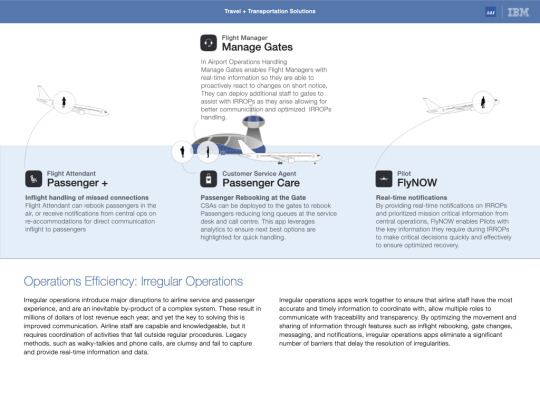
Our Travel + Transportation suite was the most complete set of enterprise iOS apps, and by 2017, covered end-to-end operations for airlines.

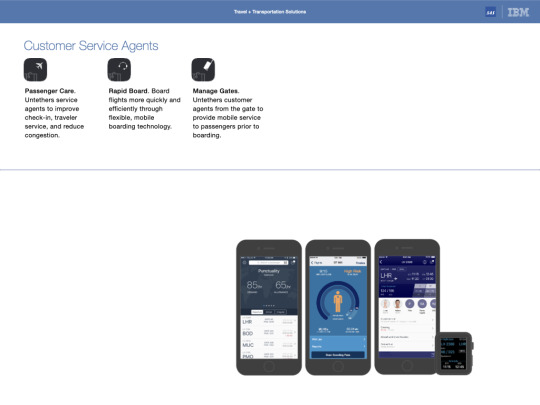

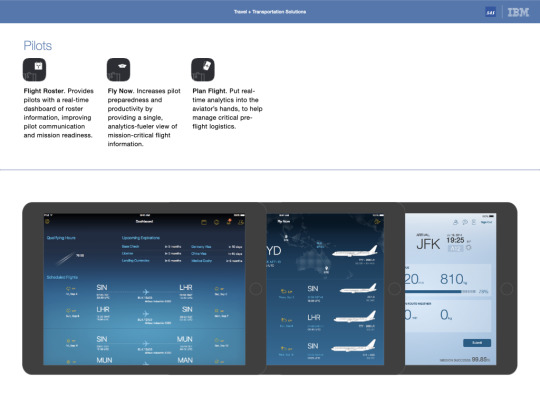
The apps were targeted at 4 primary roles, enabling them to have real-time untethered access to centralized mission-critical operational data.
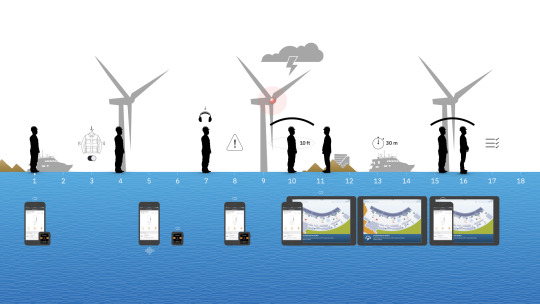
Our Energy + Utilities suite was not as extensive, but combined a series of apps for renewable energy workers.

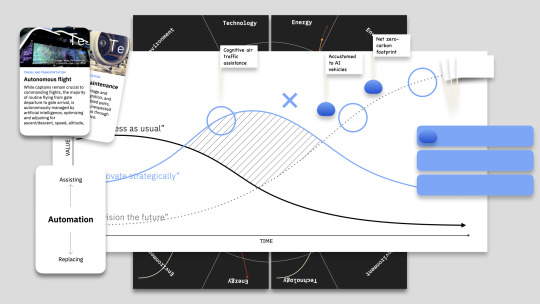

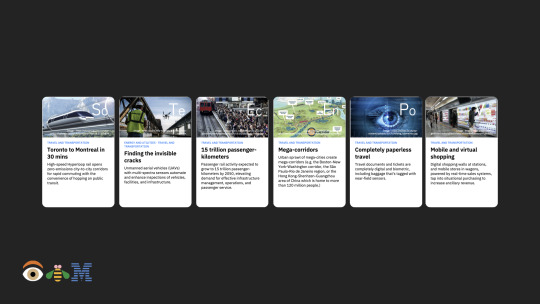

From 2017, we began to push innovation further with strategic foresight, exploring the future of travel, and working with Apple on designing solutions using emerging technologies such as point-to-point networking, AR, and AI.
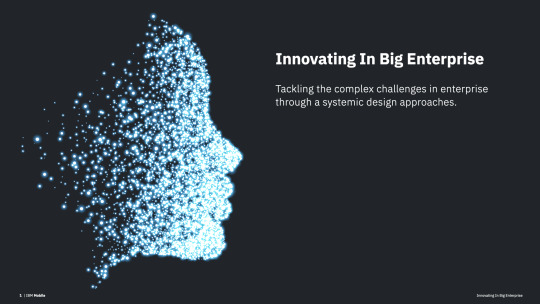

↑ My talk on Innovating in Big Enterprise at our 2018 Aviation Summit covered a broad range of design-oriented practices and methods for driving and realizing innovation.
↗ Followed-up next year with a talk on Enterprise Futures, using strategic foresight to detect, discover, and predict emerging signals that influence or help to define product and business roadmaps.

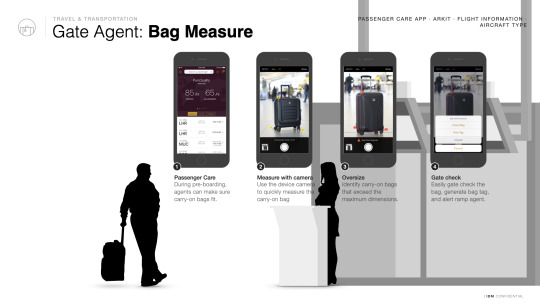
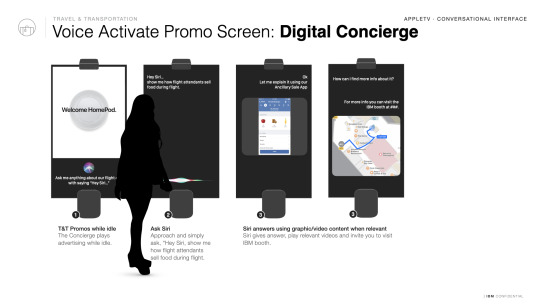
↑ These were demonstrated in new apps for in-cabin collaboration, baggage gate-checks, ramp loading, and airport customer service.
↓ We even time-machined the future experience at the the T+T innovation fair in Abu Dhabi.

0 notes
Text
App Development Trends You Can’t Ignore in Jeddah
In the evolving digital landscape, mobile app development company in Jeddah has gained enormous momentum. As the city grows as a technological and entrepreneurial hub, startups and enterprises alike are investing in innovative app solutions to meet customer needs and remain competitive. The rising demand for intuitive and scalable applications has given birth to several app development trends in Jeddah that businesses simply can't ignore in 2025.
1. Rise of Cross-Platform Development

Businesses in Jeddah are increasingly choosing cross-platform app development to save time and money. Tools like Flutter and React Native allow developers to write one codebase and deploy apps for both Android and iOS platforms. This trend ensures faster time-to-market and unified user experience.
2. AI-Powered Mobile Apps
Artificial Intelligence is transforming how users interact with mobile apps. From chatbots in customer service apps to personalized recommendations in e-commerce platforms, AI integration in Jeddah apps is enabling smarter, faster, and more efficient services. Five Programmers is actively integrating AI features into apps to offer intelligent functionalities.
3. Integration of Augmented Reality (AR)
AR in app development is redefining user experiences, especially in sectors like real estate, fashion, and education. Businesses in Jeddah are utilizing AR to provide immersive app features such as virtual product trials, guided property tours, and interactive learning.
4. Focus on Cybersecurity
With increasing digital threats, mobile app developers in Jeddah are prioritizing security. Biometric authentication, end-to-end encryption, and secure coding practices are becoming essential in every app project.
5. Demand for Instant Apps
Instant mobile apps allow users to access core features without full installation. This trend is gaining popularity in Jeddah due to the growing demand for convenience and low data usage. Businesses are now asking developers like Five Programmers to create lightweight, fast-loading apps that deliver value instantly.
6. Cloud-Based Applications
With the shift toward remote operations and scalability, cloud-based mobile apps are becoming standard in Jeddah's tech environment. These apps offer greater storage, faster performance, and seamless syncing across devices.
7. Super Apps Are on the Rise
Inspired by platforms like WeChat and Grab, super apps that integrate multiple services in one app are gaining traction in Jeddah. From ride-hailing to food delivery, businesses are exploring ways to create all-in-one digital ecosystems.
8. Integration with Wearables
The growing use of wearable devices like smartwatches and fitness trackers has led to increased demand for app development for wearables in Jeddah. Health, fitness, and productivity apps are now being tailored to sync smoothly with wearable gadgets.
9. Voice User Interfaces (VUIs)
Voice commands are becoming more popular with virtual assistants like Siri and Google Assistant. Voice-enabled app development is one of the most talked-about trends in Jeddah, offering hands-free convenience and accessibility.
10. Localization and Multilingual Apps
Businesses in Jeddah are focusing on developing multilingual apps to cater to diverse user bases, including Arabic-speaking and international users. Localized content boosts user engagement and customer satisfaction.
Why Choose Jeddah for Your Mobile App Development?
Jeddah is rapidly becoming the next tech frontier with access to local talent, startup support programs, and increasing government initiatives to digitize services. Companies like Five Programmers are at the forefront, offering cutting-edge app development services in Jeddah that combine creativity, technical proficiency, and user-focused design.
Frequently Asked Questions (FAQ)
Q1: Why is cross-platform development becoming popular in Jeddah? Because it allows businesses to launch apps faster and more affordably while covering both Android and iOS users with a single codebase.
Q2: Are AI-powered apps in demand in Jeddah? Yes, businesses are leveraging AI to automate tasks, enhance personalization, and provide intelligent features that improve user experiences.
Q3: Is it necessary to localize apps for Jeddah? Absolutely. Creating multilingual apps tailored to Arabic-speaking users helps increase engagement and ensures cultural relevance.
Get a Quote Today!
Looking to build your next app in Jeddah? Don’t wait. Reach out to Five Programmers for custom mobile app solutions that align with your business goals. Whether it’s iOS, Android, cross-platform, or wearable apps – we’ve got you covered.
Contact Us Today and transform your idea into a successful digital product with Five Programmers at your side.
#mobile app development company in Jeddah#Mobile app developers in Jeddah#app development companies in Jeddah#Technology#tech
0 notes
Text
10 Key Trends Shaping the Future of Mobile App Development in 2025
The mobile app development industry is constantly evolving, and as we move deeper into 2025, innovation is at an all-time high. From AI integration to 5G and cross-platform tools, the way apps are being built—and used—is transforming. If you're a business looking to build or improve your app, understanding these trends is crucial. Here are 10 key trends that are shaping the future of mobile app development in 2025:
1. AI and Machine Learning Integration
AI isn't just a buzzword anymore—it's a necessity. From personalized recommendations to intelligent chatbots, mobile apps in 2025 are leveraging AI to enhance user experiences and automate processes. Machine learning algorithms are helping apps learn from user behavior and improve over time.
2. 5G Technology for Enhanced Speed
The rollout of 5G networks is a game-changer for mobile apps. Faster data transfer speeds mean smoother streaming, real-time gaming, and instant app responsiveness. Developers are now building high-performance apps that were previously limited by slower networks.
3. Cross-Platform Development
Frameworks like Flutter, React Native, and Xamarin are enabling developers to build apps for both Android and iOS using a single codebase. This not only saves time and cost but also ensures faster time-to-market and consistent performance across platforms.
4. Progressive Web Apps (PWAs)
PWAs are blurring the line between mobile apps and websites. They load quickly, work offline, and provide an app-like experience without requiring downloads. Businesses are adopting PWAs to reach a wider audience with minimal development effort.
5. Enhanced App Security
With increasing cyber threats, app security is a top priority. Developers are using biometric authentication, end-to-end encryption, and secure APIs to protect user data. In 2025, users demand privacy and security as standard features.
6. Voice-Enabled Interfaces
Voice assistants like Siri, Alexa, and Google Assistant have changed how users interact with technology. Apps with voice search and control capabilities are becoming more common, offering convenience and hands-free operation.
7. Wearable Device Integration
Smartwatches, fitness bands, and AR glasses are gaining popularity. Mobile apps are now being developed to seamlessly integrate with wearable devices, offering health monitoring, notifications, and enhanced accessibility.
8. AR and VR Experiences
Augmented and virtual reality are moving beyond games. Retail, real estate, healthcare, and education apps are using AR/VR to create immersive experiences—like trying on clothes virtually or exploring a 3D home tour.
9. On-Demand Apps Continue to Rise
Food delivery, taxi booking, home services—on-demand apps are thriving. These apps are built with a focus on real-time tracking, push notifications, and seamless payment integration to meet user expectations instantly.
10. Eco-Friendly and Lightweight Apps
As devices become smarter, users are demanding apps that consume less battery and storage. Developers are now focused on creating lightweight apps that are energy-efficient, especially in regions with limited connectivity.
Conclusion
Mobile app development in 2025 is driven by speed, security, intelligence, and user-centric design. Whether you're a startup or an enterprise, embracing these trends will help you stay competitive and deliver exceptional app experiences. Want to build a future-ready app? Partner with a professional mobile app development company that understands these evolving trends and delivers scalable, secure, and innovative solutions.
#mobile app development#web development#web design#custom software services#custom software solutions
0 notes
Text
Top Challenges Developers Face in Taxi App Development

The global demand for taxi booking apps has increased in recent years. With services like Uber, Lyft, and Ola redefining urban mobility, many startups and transport businesses are eager to launch their own taxi apps. However, developing a taxi booking app is not as simple as it may seem.
In this article, we’ll explore the top challenges developers and businesses face while taxi app development and how to address them effectively.
1. Real-Time GPS Tracking and Navigation
Challenge: Accurate location tracking is critical for both drivers and passengers. GPS glitches, incorrect routing, or slow updates can lead to poor user experience.
Solution: Use reliable mapping APIs like Google Maps, Mapbox, or HERE, and implement fallback mechanisms in case of location loss. Optimize background location tracking for minimal battery drain.
2. Handling Real-Time Requests and Matching Algorithms
Challenge: Managing hundreds or thousands of users requesting rides simultaneously requires an efficient matching algorithm that pairs drivers and riders in real-time.
Solution: Leverage robust backend technologies like Node.js, Redis, and socket-based communication. Implement load balancing and use location clustering to improve request distribution.
3. Secure and Seamless Payments
Challenge: Integrating secure payment methods, supporting various currencies, and offering multiple payment options (card, wallet, UPI, etc.) can be complex and regulated.
Solution: Use PCI-DSS-compliant gateways like Stripe, Razorpay, or Braintree. Enable tokenization for user data security and offer localized payment solutions for different markets.
4. Multi-Platform Compatibility (iOS & Android)
Challenge: Ensuring consistent performance and user experience across both Android and iOS devices, while keeping taxi booking app development cost-efficient, is a major challenge.
Solution: Consider cross-platform frameworks like Flutter or React Native to reduce development time while maintaining quality. For larger enterprises, native development might be preferred.
5. Scalability and Performance
Challenge: Taxi apps must be ready to scale as user demand grows—especially during peak times or geographic expansion.
Solution: Use a microservices architecture, cloud hosting (AWS, GCP, Azure), and scalable databases like MongoDB or PostgreSQL. Regularly stress-test your infrastructure.
6. Data Privacy and Compliance
Challenge: Handling user data, real-time locations, and payment information requires strict adherence to privacy regulations like GDPR, HIPAA, or local laws.
Solution: Implement end-to-end encryption, anonymize location data where needed, and maintain transparency with users about data usage. Always comply with region-specific legal standards.
7. Managing Driver and Rider Behavior
Challenge: Ensuring reliable service means managing unpredictable human behavior, cancellations, fraud, late arrivals, or disputes.
Solution: Build features like ratings, feedback, SOS buttons, cancellation policies, and in-app support. Use AI or pattern recognition to detect suspicious activity.
8. Localization and Market Adaptation
Challenge: If you're targeting multiple regions or countries, your app must adapt to different languages, currencies, traffic laws, and cultural expectations.
Solution: Design your app with multi-language support, real-time currency conversions, and local holiday/surge pricing logic. Understand the local ecosystem before launching.
9. Integrating Advanced Features
Challenge: Modern users expect more than just booking. Features like ride scheduling, fare splitting, loyalty programs, or AI-based ETA predictions can be hard to implement well.
Solution: Start with an MVP (Minimum Viable Product), then gradually introduce features. Use AI and machine learning for predictive analytics and route optimization.
Final Thoughts
Building a successful taxi app requires more than just sleek design and smooth booking flows. It demands technical expertise, infrastructure planning, regulatory compliance, and a deep understanding of user behavior. By being aware of these challenges upfront, you can develop more robust, user-friendly, and scalable on-demand taxi booking apps.
0 notes
Text
“The Ultimate RDP Checklist: What to Look for in Remote Access Software”
In today’s hybrid and remote-first business environment, having reliable Remote Desktop Protocol (RDP) software isn’t optional—it’s essential. But with so many options in the market, how do you choose the right one?
Whether you're a system administrator, a business owner, or a startup founder, this ultimate RDP checklist will help you evaluate the features that matter most—and explain why RHosting checks all the boxes.

🔐 1. Security First: Encryption & Access Controls
Must-have:
End-to-end encryption (TLS/SSL)
Two-factor authentication (2FA)
Brute-force attack protection
IP filtering and whitelisting
Why it matters: Your remote desktop solution is a gateway to your servers. Security lapses can lead to massive data breaches. Choose software that prioritizes cybersecurity by design.
✅ RHosting delivers enterprise-grade encryption, 2FA, and granular user-level access for peace of mind.
⚙️ 2. Application-Level Access
Must-have:
Restrict access to only specific applications
Prevent users from accessing the full desktop
Why it matters: Not every user needs full server access. Limit exposure and reduce the chance of accidental (or intentional) damage.
✅ RHosting lets you assign individual apps to users—great for contractors, part-timers, and clients.
🗂 3. Granular Folder-Level Permissions
Must-have:
Assign folder-level access based on user roles
Read/write permissions customization
Why it matters: Need-to-know access prevents data leaks and keeps sensitive information restricted to authorized users.
✅ RHosting offers a highly configurable control panel to define folder-level rules across departments.
🚀 4. Performance & Speed
Must-have:
Low latency connections
Optimized for bandwidth efficiency
Fast load times for large apps and files
Why it matters: Lag can destroy productivity. Ensure your RDP software is optimized for both speed and heavy use.
✅ RHosting is designed for high performance—even with resource-intensive applications like development tools or data analysis software.
📲 5. Device & OS Compatibility
Must-have:
Windows, macOS, Linux, iOS, and Android support
Web-based access option
Why it matters: Your team likely uses multiple devices. Cross-platform support ensures everyone can work from anywhere.
✅ RHosting offers multi-device compatibility with browser-based login, eliminating software installs.
🔧 6. No Hardware Configuration Required
Must-have:
Cloud-hosted RDP service
Plug-and-play setup
No need for on-premise servers
Why it matters: Startups and small businesses shouldn’t need an IT department to deploy remote access. Look for a provider that offers a zero-hardware setup.
✅ RHosting is fully cloud-based—no server setup or firewall configurations required.
📊 7. Scalability & Flexibility
Must-have:
Easy to add/remove users
Scalable storage and processing power
Pricing that grows with your needs
Why it matters: Your RDP solution should grow as your team grows—without disruption.
✅ RHosting allows on-demand scaling and user management via an intuitive dashboard.
🛠 8. Admin Tools & Analytics
Must-have:
Centralized admin dashboard
User activity logs and access history
Real-time monitoring
Why it matters: Admins need insight into who accessed what, when, and from where—especially for audits and compliance.
✅ RHosting delivers full visibility with real-time logs and activity reports.
✅ Conclusion: Not All RDP Software Is Created Equal
The best RDP solution isn’t just about connecting to a remote machine—it’s about security, performance, control, and user experience.
Use this checklist to compare your current or potential provider. If you're ready for a smarter, more secure way to work remotely, RHosting is your answer.
🚀 Ready to experience remote access without compromise?
Sign up for a free trial of RHosting and discover why IT teams, startups, and enterprises trust us to power their remote work.
0 notes
Text
How Long Does It Take To Develop A Mobile App in 2025?

In an increasingly mobile-first world, the demand for innovative, feature-rich mobile apps continues to grow. As we move through 2025, businesses and entrepreneurs are turning to digital solutions not just for convenience, but as critical drivers of revenue and customer engagement. One of the most frequently asked questions by startups and enterprises alike is: “How long does it take to develop a mobile app in 2025?”
The short answer? It depends.
While many factors influence the timeline—such as complexity, platform, and resources—this blog will give you a clear, realistic breakdown of what goes into mobile app development and how long you should expect each phase to take. We'll also explain how working with a trusted mobile app development company in London or experienced app developers in London can help streamline the process without compromising on quality.
What Influences Mobile App Development Time in 2025?
Before diving into numbers, it's important to understand what shapes the development timeline. App development in 2025 is more efficient than ever thanks to evolving frameworks, AI-assisted coding tools, and better project management methodologies. However, the core stages of app development remain largely the same:
Discovery and Planning
Design and Prototyping
Development
Testing and QA
Deployment and Launch
Post-Launch Updates and Maintenance
Each of these stages takes time—and the duration varies based on a number of key factors.
Key Factors Affecting Timeline:
App Complexity (Basic, Mid-Level, or Advanced)
Number of Features
Platform (iOS, Android, or both)
Backend Infrastructure
Third-party Integrations
Team Size and Expertise
Custom Design Requirements
Regulatory or Security Compliance
Working with a seasoned app development company in London helps ensure all these elements are managed effectively from the start.
Typical Timeframes for Each Stage of Development
Let’s take a deeper look at how much time each phase usually takes in 2025, assuming you’re working with experienced mobile app developers in London.
1. Discovery and Planning (2–4 weeks)
This stage lays the foundation for everything else. It includes:
Requirements gathering
Market research
Competitor analysis
Defining app goals and KPIs
Roadmap creation
By collaborating with a mobile app development company in London, you’ll benefit from strategic insight into your industry and user expectations. A well-planned discovery phase reduces costly revisions later.
2. Design and Prototyping (3–5 weeks)
Once planning is complete, it’s time to design the user experience (UX) and user interface (UI). This includes:
Wireframes
User journey mapping
High-fidelity UI mockups
Clickable prototypes
Mobile app designers in London play a key role here, ensuring the app is not only beautiful but intuitive. In 2025, tools like Figma and Adobe XD allow faster iteration and real-time collaboration, cutting down design cycles significantly.
3. Development (6–18 weeks)
This is often the most time-intensive phase. The development timeline depends heavily on complexity.
Basic app (e.g., a calculator or single-function utility): 6–8 weeks
Mid-level app (e.g., a booking system or fitness tracker): 10–14 weeks
Advanced app (e.g., e-commerce, fintech, social media): 16–20+ weeks
This phase involves frontend development (what users see) and backend development (server-side logic, databases, APIs). A competent app developer in London will ensure clean, scalable code and modular design, helping reduce bugs and improve maintainability.
4. Testing and QA (2–4 weeks)
Quality Assurance (QA) is crucial. Skipping this stage risks launching an unstable product that frustrates users and damages your brand.
Testing typically includes:
Functional testing
Usability testing
Performance testing
Security testing
Device and OS compatibility
An experienced app development company in London will use both automated and manual testing tools to catch issues early. In 2025, AI-driven testing tools further streamline this phase by quickly identifying UI glitches, broken links, and more.
5. Deployment and Launch (1 week)
Launching the app on app stores is faster than before, but still requires careful attention:
App Store (iOS) and Google Play (Android) submission
Review and approval process
Metadata creation (description, screenshots, keywords)
Configuration of analytics and crash reporting
A mobile app developer in London will handle all the technical steps to ensure a smooth rollout and app store compliance.
6. Post-Launch Maintenance (Ongoing)
Post-launch support is critical. Even after launch, your app will need:
Bug fixes
Feature updates
Performance enhancements
OS compatibility updates
Most app development companies in London offer ongoing maintenance contracts. This ensures your app stays secure, competitive, and up to date with user expectations.
How Long Does It Take on Average?
Here’s a quick breakdown based on typical project sizes:
App Type
Estimated Timeline
Basic App
8–12 weeks
Mid-Level App
12–18 weeks
Advanced App
20–26+ weeks
Note: These are general estimates. A reliable mobile app development company in London will tailor the timeline based on your specific goals, technology stack, and business needs.
How to Speed Up Mobile App Development Without Cutting Corners
Everyone wants a faster launch—but speed should never come at the cost of quality. Here's how to keep things moving without sacrificing results:
1. Choose the Right Partner
Partner with a trusted app development company in London that has proven experience, robust processes, and local knowledge. Look for case studies, testimonials, and a portfolio of successful apps.
2. Use Agile Methodology
Agile development allows for faster iteration, frequent testing, and easier adaptation to changes. Your app is developed in sprints, so you can see progress regularly and provide feedback early.
3. Prioritize a Minimum Viable Product (MVP)
Instead of building every feature at once, start with the core functionality. Launch an MVP to test the market, gather user feedback, and then enhance the app in future versions.
4. Leverage Pre-Built Frameworks
Frameworks like Flutter, React Native, and SwiftUI have matured significantly by 2025. These tools help mobile app developers in London build cross-platform apps faster without compromising on performance or design.
Final Thoughts: Plan Smart, Build Fast, Launch Strong
Developing a mobile app in 2025 is faster and more efficient than ever—but only if approached strategically. The key to success lies in partnering with the right experts, planning ahead, and balancing speed with quality.
Whether you're a startup launching your first app or an enterprise digitizing core services, working with a reliable mobile app development company in London will ensure your vision is executed with precision, creativity, and timeliness.
From talented mobile app designers in London to skilled app developers in London, having the right team behind your app can turn a complex process into a smooth, rewarding experience.
Ready to turn your app idea into reality? Connect with a leading app development company in London and bring your mobile solution to life—on time and on budget.
#mobile app development company in london#mobile app designers in london#app development company in london#mobile app developer in london#app developer in london#How Long Does It Take To Develop A Mobile App in 2025?
0 notes
Text
Mobile App Development Trends in 2025: Tools, Tech, and Tactics
The mobile app development landscape is rapidly evolving, and 2025 is poised to redefine how businesses, developers, and users engage with technology. With billions of smartphone users worldwide and a surge in mobile-first strategies, staying ahead of trends isn't optional—it’s essential.
This blog explores the top mobile app development trends, tools, technologies, and tactics that will shape success in 2025.
1. AI and Machine Learning Integration
Artificial intelligence (AI) and machine learning (ML) are no longer optional extras—they’re integral to smarter, more personalized mobile experiences. In 2025, expect:
AI-powered chatbots for real-time customer support
Intelligent recommendation engines in eCommerce and entertainment apps
Predictive analytics for user behavior tracking
On-device AI processing for better speed and privacy
Developers are leveraging game development tools like TensorFlow Lite, Core ML, and Dialogflow to integrate AI features into native and hybrid apps.
2. Cross-Platform Development Tools Dominate
The demand for faster, cost-effective development is pushing cross-platform tools into the spotlight. Leading frameworks like:
Flutter (by Google)
React Native (by Meta)
Xamarin (by Microsoft)
...are helping developers create apps for iOS and Android from a single codebase. In 2025, expect Flutter’s adoption to soar due to its superior UI rendering and native-like performance.
3. 5G’s Impact on Mobile Experiences
With global 5G rollout nearly complete by 2025, mobile apps are tapping into its high speed and low latency to:
Stream HD/AR/VR content seamlessly
Enable real-time multiplayer mobile gaming
Power smart city apps and IoT experiences
Improve video calling and live streaming quality
App developers must now optimize for 5G networks to ensure speed and performance match user expectations.
4. Progressive Web Apps (PWAs) Gain Ground
PWAs offer the functionality of native apps with the accessibility of websites. With improvements in browser support, 2025 will see:
Increased adoption of PWAs by eCommerce and service platforms
Enhanced offline functionality
Lower development and maintenance costs
Tools like Lighthouse and Workbox are essential for optimizing PWA performance and reach.
5. Voice Interfaces and VUI Design
Voice technology continues to grow thanks to voice assistants like Siri, Alexa, and Google Assistant. In 2025, mobile apps will increasingly include:
Voice-driven navigation
Natural Language Processing (NLP) integrations
VUI (Voice User Interface) design as a new UX standard
APIs like Amazon Lex and Google Cloud Speech-to-Text are driving this innovation.
6. Increased Focus on App Security and Privacy
With rising concerns about data protection and compliance (think GDPR, CCPA), 2025 will demand:
End-to-end encryption
Biometric authentication (fingerprint, face recognition)
App Transport Security (ATS) protocols
Enhanced user permission management
Security-first development will become a competitive differentiator.
7. Cloud-Integrated Mobile Apps
Cloud technology allows seamless sync and performance across devices. Apps in 2025 will leverage cloud platforms for:
Real-time data storage and access
Cloud-hosted backend (using Firebase, AWS Amplify, or Azure Mobile Apps)
Improved scalability for user growth
Reduced device dependency and better user experience
Expect mobile and cloud integration to deepen further across industries.
8. Low-Code/No-Code Platforms Rise
Platforms like OutSystems, Adalo, and Bubble are empowering non-developers to build functional apps. In 2025:
Startups will use no-code to rapidly prototype MVPs
Enterprises will deploy internal tools faster
Developers will integrate low-code tools to reduce redundant coding
This trend accelerates digital transformation across sectors.
Final Thoughts
2025 is not about isolated innovation—it’s about convergence. The blend of AI, 5G, cloud computing, cross-platform frameworks, and security-first development is redefining how apps are built and scaled.
For businesses and developers like ApperStudios, adapting to these trends isn’t just about staying current—it’s about building smarter, faster, and more secure apps that users love.
Ready to build your future-proof app? Let’s talk about how emerging tools and tactics can power your next big idea.
0 notes
Text
Inside the Indian Mobile App Development Ecosystem: Tech, Talent & Trends
Top Mobile app development companies in India has evolved into one of the world's most dynamic tech ecosystems. With over 750 million smartphone users and a thriving developer community, India has become both a massive market and a global development powerhouse. Let's examine the key components driving this ecosystem.
1. The Technology Stack Powering Indian App Development
Core Development Frameworks
Native Development:
Android (Kotlin gaining over Java)
iOS (Swift now dominant over Objective-C)
Cross-Platform Solutions:
Flutter (Google-backed, rising rapidly)
React Native (Facebook-originated, still strong)
Kotlin Multiplatform (gaining enterprise traction)
Backend & Cloud Infrastructure
Node.js and Python dominate server-side development
AWS leads cloud adoption, followed by Google Cloud and Azure
Firebase popular for startups and MVPs
Emerging Tech Integration
AI/ML: TensorFlow Lite, Core ML, ML Kit implementations
Blockchain: Ethereum, Hyperledger for fintech apps
AR/VR: Unity, ARCore, ARKit for immersive experiences
2. The Talent Landscape: Skills & Specializations
Developer Distribution
1.2 million active app developers in India
65% focused on Android development
30% working with iOS
40% now skilled in cross-platform frameworks
Skill Evolution
Average developer knows 2.8 programming languages
Full-stack mobile developers in high demand
Specializations in AI/ML integration growing fastest
Compensation Trends
Entry-level: ₹4-8 LPA
Mid-level (3-5 yrs): ₹10-18 LPA
Senior (5+ yrs): ₹20-40 LPA
Architects/leads: ₹45-80 LPA
3. Geographic Hotspots & Development Hubs
Major Tech Clusters
Bangalore - Silicon Valley of India, startup ecosystem
Hyderabad - Growing fintech and enterprise solutions
Pune - Education hub producing quality talent
Delhi NCR - Mix of startups and corporate development
Chennai - Strong in healthcare and automotive apps
Emerging Cities
Ahmedabad (gaming apps)
Kochi (AR/VR specialization)
Jaipur (cost-effective quality talent)
4. Current Market Trends Shaping Development
Industry-Specific Boom Areas
Fintech: UPI integrations, digital banking
Healthtech: Telemedicine, AI diagnostics
Edtech: Personalized learning platforms
Social Commerce: Video-first shopping experiences
Technical Trends
Instant Apps gaining traction
App modularization for better performance
Privacy-focused development (GDPR compliance)
Low-code/no-code tools entering professional workflows
Business Model Shifts
Subscription models overtaking one-time purchases
Super apps combining multiple services
Regional language apps seeing explosive growth
5. Challenges Facing the Ecosystem
Talent Development
Need for more senior architects
Keeping pace with rapid tech changes
Balancing quantity vs quality of graduates
Market Pressures
Rising salary expectations
Global competition from other markets
Client demands for faster delivery cycles
Technological
Fragmentation in Android ecosystem
Apple's privacy changes impacting monetization
5G optimization challenges
6. The Road Ahead: Future Outlook
Growth Projections
Indian app economy to reach $30B by 2025
Expected to create 3 million+ jobs by 2026
Rural internet users becoming major new market
Innovation Frontiers
Voice-based interfaces for next billion users
AI-generated app components
Web3 and decentralized app development
Foldable device optimization
Global Positioning
Shift from service provider to product innovator
More Indian-origin apps going global
Increased M&A activity in the space
Conclusion
The Indian mobile app development ecosystem represents a unique blend of technical prowess, entrepreneurial energy, and cost-effective innovation. With its vast talent pool, rapidly evolving skill sets, and proven ability to deliver at scale, India is positioned to remain at the forefront of global app development.
As the ecosystem matures, we're seeing a transition from outsourcing hub to innovation center, with Indian developers and companies increasingly creating world-class products and setting global standards. The coming years will likely see India solidify its position as both the world's developer and a leading digital products creator.
0 notes